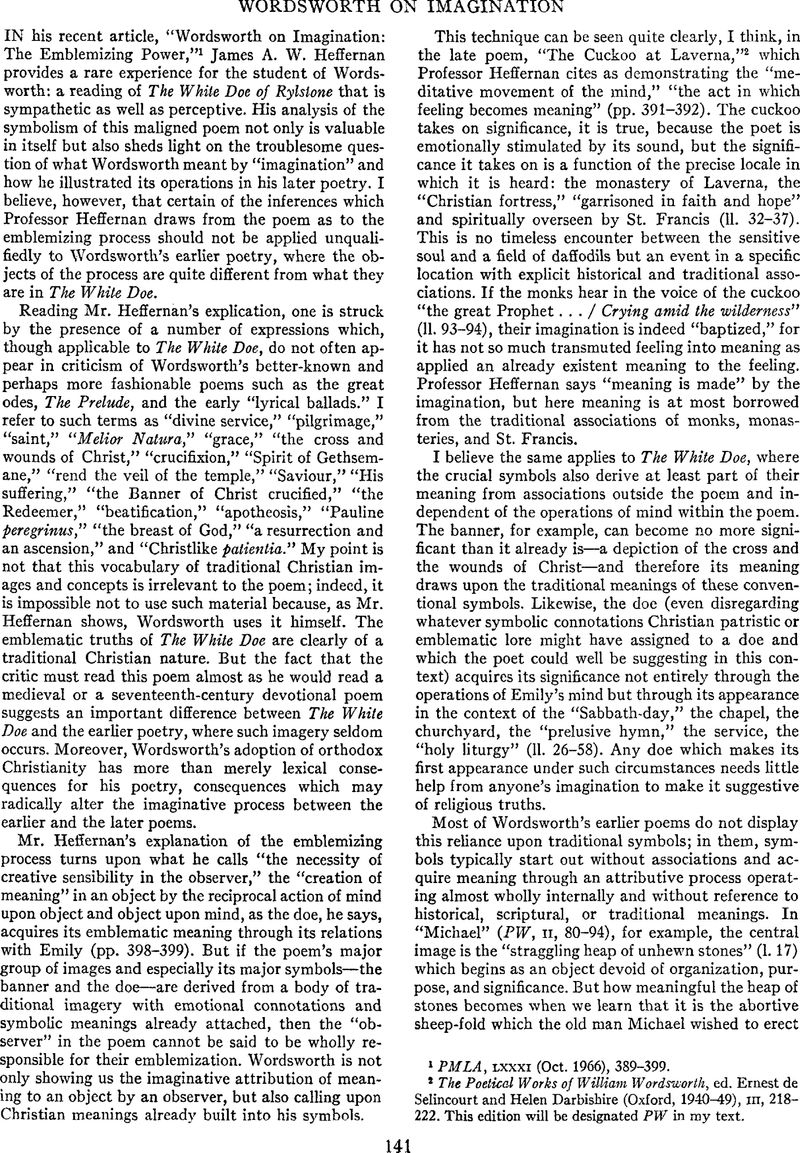No CrossRef data available.
Article contents
Wordsworth on Imagination
Published online by Cambridge University Press: 02 December 2020
Abstract

Information
- Type
- Notes, Documents, and Critical Comment
- Information
- Copyright
- Copyright © Modern Language Association of America, 1969
References
1 PMLA, lxxxi (Oct. 1966), 389–399.
2 The Poetical Works of William Wordsworth, ed. Ernest de Selincourt and Helen Darbishire (Oxford, 1940–49), in, 218–222. This edition will be designated PW in ray text.
3 See PW, ii, 478–479.
4 See PW, ii, 511–513.
5 On the parodies, see Lascelles Abercrombie, The Art of Wordsworth (New York, 1952), pp. 137–141; George L. Marsh, “The ‘Peter Bell’ Parodies of 1819,” MP, xl (1943), 267–274; and A. E. H. Swaen, “Peter Bell,” Anglia, xlvii (1923), 136–184.
6 Although this dedication was written in 1819, long after the poem itself, it is an accurate description of what happens in the poem (though a few of the events, if not supernatural, are improbable, such as the Methodist service in the middle of the night). As Mr. Heffernan states, Wordsworth evidently did not change his basic concept of the imaginative process, but nevertheless he seems to have been unaware that (as I contend) his use of Christian materials would alter the process as it is demonstrated in practice in the actual poems.
7 Raymond Dexter Havens discusses Wordsworth's faith in the spiritual value of common reality in The Mind of a Poet (Baltimore, 1941), pp. 14–25.
8 For an argument that Peter Bell is a “poem of fancy” and not of imagination, see Kathleen Coburn, “Coleridge and Wordsworth and ‘the Supernatural’,” UTQ, xxv (1956), 121–130.
9 See David Ferry's discussion of Wordsworth's concept of contact with the dead as spiritually fruitful, The Limits of Mortality: An Essay on Wordsworth's Major Poems (Middle-town, Conn., 1959), p. 64.
10 Melvin Rader, Presiding Ideas in Wordsworth's Poetry, Univ. of Washington Studies in Lang, and Lit., viii, No. 2 (Seattle, 1931), pp. 121–216, argues that what Wordsworth calls “Spirits of the Mind” are really animistic forces in nature. One factor preventing an ascription of animism to Wordsworth is that it is “experience” and not only “nature” which he believes to provide spiritual truth, as he suggests in the 1800 Preface (PW, ii, 387). Critics have perhaps overemphasized nature at the expense of experience in Wordsworth's scheme. In any case, there is clearly no animism in the human contacts from which Peter Bell learns, such as the sermon and his observation of the dead man's family.
11 William Wordsworth: His Life, Works, and Influence (New York, 1916), ii, 303.
12 See Heffeman, p. 392.
1 Carlos Baker observes that Michael is “formed and strengthened by his mountainous environment and his enduring and durable will. Levavi oculos meos in montes runs the psalm; and this is part of Wordsworth's testament.” “Sensation and Vision in Wordsworth's Poetry,” English Romantic Poets: Modem Essays in Criticism, ed. M. H. Abrams (New York, 1960), p. 99. The influence of the Old Testament on “Michael” has been treated extensively in an unpublished paper by Carl Dawson of the Univ. of California at Berkeley.
2 See his note to Fidelity (PW, iv, 417), and Kenneth Curry, “A Note on Wordsworth's ‘Fidelity’,” PQ, xxxii (April 1953), 214.
3 Mr. Pfeffer's commentary on the Prologue blurs the distinction between Scriptural imagery and Spenserian romance, which draws on Scriptural imagery. Spenserian romance also draws on epic conventions, which include fantastic situations and supernatural agency, and it was these that Wordsworth rejected. He was not repudiating everything traditional—else even his Methodist preacher would have had to go.

